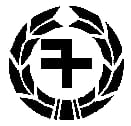New Triumph Party Partido Nuevo Triunfo | |
|---|---|
 | |
| Founder | Alejandro Biondini |
| Founded | 14 March 1990 |
| Dissolved | 17 March 2009 |
| Split from | Justicialist Party |
| Preceded by | Partido Nacionalista de los Trabajadores |
| Succeeded by | Alternativa Social (2009-2013) Bandera Vecinal (2013-2019) Patriot Front (since 2019) |
| Headquarters | Buenos Aires, Argentina |
| Ideology | Neo-Nazism Third Position Orthodox Peronism Anglophobia Anti-immigration White supremacy [ citation needed ] White nationalism [ citation needed ] Nacionalismo Irredentism |
| Political position | Far-right |
| Party flag | |
 | |
Partido Nuevo Triunfo (New Triumph Party) was a small far-right and Neo-Nazi political party in Argentina banned on 17 March 2009 through a ruling by the Argentine Supreme Court of Justice. [1]